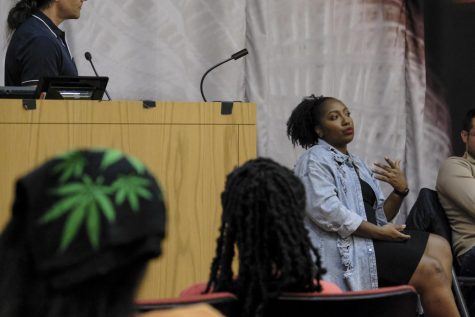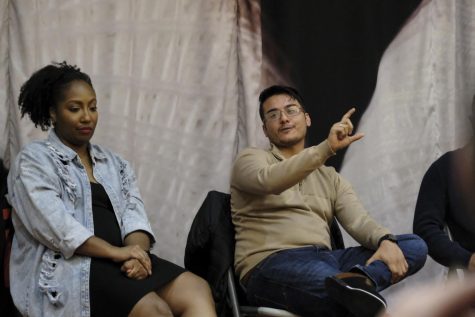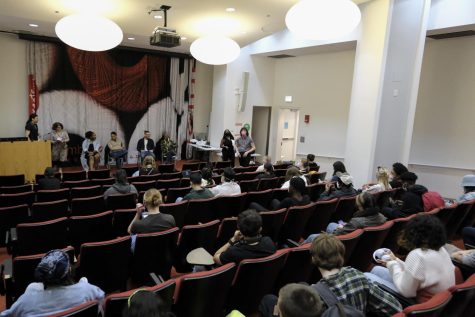Cannabis industry panelists share misconceptions and insights on the profession
October 11, 2022

Arianne Richards, a certified professional interpener — also known as a cannabis sommelier — has wondered if her children have ever been asked what she does for a living.
“In our home, I don’t hide my use; I don’t hide that I grow,” Richards said. “Because at the end of the day, this is an industry that [my children] can go into one day, and it’s a billion dollar industry. And why am I going to shield them from something that, one, first is medicine, and that’s how I teach it to them, like this is medicine first.”
Richards, the founder of Chicago Cannabis Concierge, which provides services, education and advocacy in the cannabis industry, was one of the four panelists at the Career Center’s first “Careers in Cannabis” panel at the Ferguson Theater, 600 S. Michigan Ave., on Wednesday. The panelists discussed a wide variety of topics related to the cannabis industry, from misconceptions and diversity and equity issues, to job networking within the profession.
Since the topic of cannabis is new for the Career Center, Tom Joyce, an internship and career adviser at Columbia and co-host of the event, said conversations with college administrators were held before the event was approved.
“We’ve talked to so many professionals in the cannabis industry, and also students who were asking about it, and it was a little bit of a gray area with Columbia, whether or not our students could apply for an internship at a cannabis company,” Joyce said.
The school agreed to allow internships in the cannabis industry through the Career Center, with the requirements that the students applying must be over the age of 21, there must be no handling of cannabis directly and both the company and student must be working in a state where it is legal.
Jennifer Halperin, internship and career adviser and co-host of the event, recognized the multitude of creative roles needed in the cannabis industry, appealing to many Columbia majors.
“Cannabis companies also need creative workers, like graphic designers and social media directors and copywriters,” Halperin said. “So I figured it would be a good idea for Columbia to look into hosting an event like this.”

Brandon Smith, a panelist and national retail training manager for Curaleaf — a health and wellness cannabis company — and a 2014 journalism alum, shared with attendees his jump into the cannabis industry after moving to Colorado in his early twenties. He recognized the medicinal aspects of cannabis and began advocating for its use.
“When it comes to cannabis, it’s how you normalize it,” Smith said. “And for most people who use cannabis from a medicinal perspective, it’s how does cannabis make you feel normal again, not necessarily how it enhances you or fixes you or cures anything, but more so how does it make you feel like yourself?”
Smith said medicinal purposes could extend to anyone, from an older patient who has glaucoma to a child who has epilepsy.
Alongside Smith and Richards, Abraham Villegas, founder of The Cannabis Community and senior manager of marketplaces at Cresco Labs, and Shawnee Williams, co-founder of Illinois Equity Staffing and a Women Business Enterprise firm, were on the panel.
Williams shared insight into the lack of diversity in the industry, explaining how red tape and badging requirements can make it difficult for people of color to get their foot in the door.
Williams said a research study she oversaw found disparities in licenses awarded to Black and Brown people in each of the 17 states with legalized recreational use of cannabis in the U.S.
Richards said she hopes to see more Black and Brown people in the field and for true equity in the industry.
“I hope to see Black and Brown people not struggle with capital to open up their businesses. … I just want to see more people that look like me doing this, especially considering we are the ones who have suffered the most behind the war on drugs and still are suffering,” Richards said.

On the same day as the event, President Joe Biden announced he would pardon all prior federal offenses of simple marijuana possession, recognizing conviction rates and its effect on Black and Brown people.
“It’s legal in many states, and criminal records for marijuana possession have led to needless barriers to employment, housing and educational opportunities, and that’s before you address the racial disparities around who suffers the consequences,” Biden said in the announcement. “While white and Black and Brown people use marijuana at similar rates, Black and Brown people are arrested, prosecuted and convicted at disproportionate rates.”
Leid Graebe, senior music business major, said they benefited from the panel and learned about how to connect the music business to the cannabis industry.
“I had never considered that you could bring music business into the cannabis industry because they were mentioning that they were selling paraphernalia and other products at festivals and concerts and things like that,” Graebe said. “And that’s certainly something that I would like to think about doing in the future.”
All of the panelists recommended using LinkedIn as an avenue to help break into the industry, saying other sites like Instagram and Google will often shadow ban content or shut down pages.
“LinkedIn has welcomed the cannabis industry with open arms; that’s where a lot of deals are made, and a lot of network connections are made as well,” Williams said.
He added that most of the connections are to jobs that do not require handling any cannabis.
“Sixty-seven percent of the industry doesn’t touch the plant,” Williams said. “That’s the majority of us. … So I mean, if I were you, I would say forget touching the plant.”







